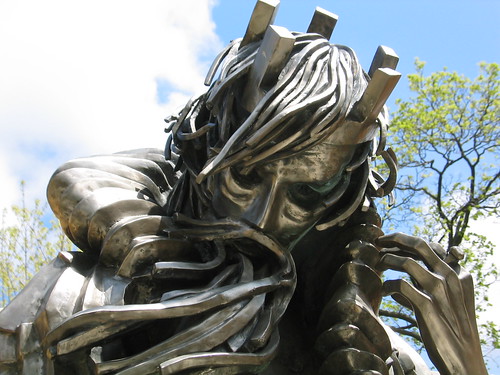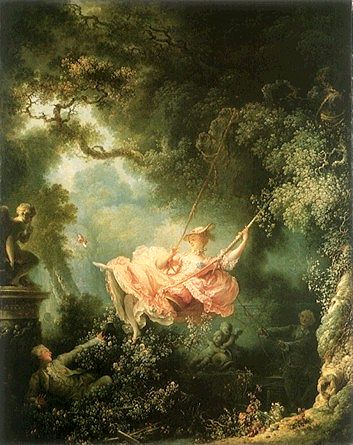Respond to at least one of the following in the comments box:
The theme of identity (especially change and disguise) in act one
The theme of nature and naturalness in act one
The motif of "nothing[ness]" in act one
The parallels in the plot and subplot in act one
The use of dramatic irony in act one
The dynamic between parents and children, nobility and servants
or something else you've notice in act one
Wednesday, March 5, 2008
Subscribe to:
Post Comments (Atom)








17 comments:
The identities of the characters represent extremes. They have firm opinions; Cordelia has a low opinion of her father and expresses her honest love, Goneril disapproves of her fathers knights and speaks ill of them even when her honesty upsets her father. The characters also abruptly change. Kent was at first a sensible respected man of the court, later he becomes an almost abstract brash character as he infiltrates the kings court after his banishment. Goneril was at first willing to lie to appease her father but is later seen chastising his ways. The characters have identities that change suddenly, adopting completely different open opinions.
The parallels in the first act of King Lear are in no way a mistake. Both King Lear and Gloucester face the same problem brought upon them by their ignorance. Their favored child ( Cordelia and Edgar)has supposedly wronged them and was then forced to leave. This of course left Lear and Gloucester with the dishonest evil kin. Both of their sufferings can be traced back to them only living for their own pleasures. Lear's need to hear his daughter's pledge their love for him and Gloucester's ignorance to his bastard son. Another parallel would be that the evil kin Edmund and Goneril both use words without meaning to please their fathers for their own advancement to money and land. It is the different ways in which they respond to the situation that makes it more interesting for the reader.
John Ryan
Shakespeare’s use of dramatic irony appeared to be absent in King Lear until the bastard Edmund’s soliloquy in Act I scene 2. Very similar to Hamlet’s King Claudius, Edmund reveals his sinister plan to the audience while the other characters remain unaware. Edmund’s interactions shortly after exemplify dramatic irony. Terribly dry sarcasm is unearthed and ridiculous puns are unleashed simply for the entertainment of the audience and little more. The perfect example is when Edmund is speaking with Edgar. Edgar professes that someone wishes him ill and Edmund expresses his support for the claim that someone is attempting to wedge a web of dangerous lies between Edgar and his father, Gloucester. The audience in this case is allowed to look at this story from above with seemingly omnipotent knowledge and understanding of the characters, the inner-workings of their social hierarchy, and their devious dreams and plans.
The parallels in ACT ONE seem to be in the oddest places. The families are both similar; the fathers are old and the children are looking to gain land or looking to have truth. there are parallel between Cordelia and Edgar, the sisters and the bastard (Jake) and the king and Gloucester. They are both ignorant to the evil children, while the ones that are good are punished. Cordelia is disowned and her counter banished. Even the language is parallel, with the fathers addressing their children with similar words.
There is a clear parallel between the stories revolving around King Lear and the Earl of Gloucester. The stories have the same arrangement of players, but these characters choose to act in distinctly different ways. In the former, Lear offers fortune for a pledge of love from his daughters. In the latter, Gloucester has a situation thrust upon him where he must choose who will receive his fortune (through trust). In the first, the youngest daughter (Cordelia) does not taint her love for her father, choosing to maintain the integrity of that bond rather than reap the benefits of it. In the second, Edmund, the younger and illegitimate son, exploits any trust that Gloucester has for him in order to gain wealth and power. Also, Lear has the ability to see that his daughter Goneril had ulterior motives, that her outburst of “love” was mere rhetoric. Gloucester, in contrast, is less perceptive, easily duped by Edmund’s duplicity. However, I feel it is important to note that Lear is not always more insightful than Gloucester. After all, both are manipulated by their children; the difference lies in that Lear at least perceives one of these seditious acts.
Tuany Lopes
The parallels in King Lear describes similar situations concerning two different men. Both Lear and Gloucester encounter similar problems with their children. It is clear that both men have loyal and disloyal children. The disloyal children seem successful in their scheming against their fathers while those who are honest and devoted to their father are punished. Edgar and Cordelia are banished by their fathers due to the manipulation of their other children. The selfishness and greed Edgar, Regan, and Goneril posses gives them smooth, insincere language in manipulating their father. The parallels in both cases show two loyal children who actually have honest, true feelings ignored by their father because they worry they do not have enough love or want riches. It is only after the chosen children begin disappointing Gloucester and Lear do they become aware of who was truthful.
John Castellucci
In act one of King Lear the parallels between Gloucester and Lear become very clear. For one, both have their child (or children in Lear's case) in a sense betray them, whether it realized like in Lear's case or yet to be realized as in Gloucester's case. Another parallel between the two sets of children is the "traitors" to the family are both concerned primarily with their own wealth/land. One last thing that connects the two families is the fact that both Gloucester and Lear side with the children that want to betray them.
As with most of our stories, the characters in King Lear who live by passion are alienated. Being the only honest daughter, she is the one to be disowned, first by her father and then she is rejected by her prospective husband. Also, the conflict between siblings and parents occurs between both King Lear's family and Gloucester's. The theme of having an identity and being true versus one's role in one's family is obvious. The conflict between the siblings arise because of one sibling's desire to pick away their parents wealth.
Shakespeare makes obvious use of dramactic irony in act 1 of King Lear with the actions of The Bastard Edmund. Edmund reveals in his dark yet eloquent soliloquy his wonderfully twisted plan to turn his father, Gloucester, against Edgar, the legitimate son. While the audience is fully aware of Edmund's cunning evil, neither Gloucester nor Edgar is at all aware that Edmund is the cause of the rift between them, and both still take Edmund at his word. Oh, and haha roflol to molly.
Probably one of the most common among the topics about Act 1 of King Lear is that of the relationship between parents and their children. When viewing both the plot and the subplot there are clear issues with both. In the main plot it is clear that King Lear must have power over his children, obviously if he makes them profess his love to him in front of many onlookers. When it comes to Cordelia and her relationship with her father it seems as if she is willing to allow the relationship to dismantle in order to do what she finds as right. In the subplot the parent/child relationship is more about gaining acceptance. In the case of Edgar he will go to all ends to gain the acceptance of his father, who just views him as a bastard. With this, Edgar may be looking for power as well, for with the acceptance of his father comes the power in land and such given to him.
Dramatic irony is definitely a strong theme in Act one of King Lear. Shakespeare shows this irony with the bastard son Edmund. Edmund is fabricating all of these lies against his brother so he can gain respect from his father. It is truly ironic that Edmund is using lies to gain respect from his father. The right way to gain respect would be with respect not with lies. He doesn’t want to be seen or treated as the “bastard” child but he is using lies and is acting the opposite that he wants to be treated.
Lear repeats the word and idea of nothingness in his speech throughout Act I, which displays his obsession with the idea of having and being nothing in his old age. The fool reinforces Lear's fear of nothingness by making a mockery of his words. For example Lear says to Cordelia," Nothing will come of nothing," and the fool later says to Lear, " You gave me nothing for 't.-Can you make no use of nothing, nuncle?" Lear responds, "Why no, boy. Nothing can be made out of nothing."
By the end of Act I Lear is on his way to being left with nothing. He has already lost his land and power, and the love and allegiance of two daughters. Lear feels empty and without a purpose, which connects to his identity crisis. He states that he no longer knows who he is and the Fool responds that he is only a shadow of Lear.The fool therefore fuels Lear's fear of being nothing and having nothing.
Much like the use of "eye" and "I" in Hamlet, nature signifies more than one thing in King Lear. The natural order is something seen through most of the play- the "natural" order of Royalty, etc. In scene one, Edmund is introduced to the reader. Natural law/order says that because Edmund is Gloucester's illegitimate son, he will inherit nothing. In scene two, this is seen again. He calls to nature to stand by him to get his share of an inheritance. In scene 4, Lear is bitter towards Goneril, calling on NATURE to to make her "sterile forever." Lear is using nature in broad terms here. The fool, a rather ironic character, because he is actually a wise man, talks to Lear about knowledge and time, saying that the King grew old before he was wise- a reversal of the natural order.
The main plot of King Lear is about a king using unfair methods to bestow his inheritances upon his three daughters. This is similar to the subplot of the bastard Edmund's pursuit to steal the status of his legitimate half-brother. Two honest, deserving characters are banished (Cordelia and Edgar), teaching a lesson to the reader that egotism and hedonism can have a huge effect on a person's judgement.
The theme of nothingness between family members exists in the first act. As King Lear decides to step down from the thrown he asks his daughters to express how much they love him. After asking them to do so he realizes that their love for him does not exist, what he thought was, is nothing. This problem is similar with Gloucester and his sons. Gloucester son’s try to plot against him and accuse the other of trying to kill their father. These two problems with King Lear and Gloucester show that what they thought existed between themselves and their children was not what they thought.
The parralels through Act one are desplayed between the relationship Gloucester and Lear have with their children. Both are deceived by their offspring and dismiss the offsping that is actually being genuine and true to them. As Lear dismissed Cordelia when she will not profess her love to him and when Gloucester is fooled by Edmund into thinking that Edgar is after his life. There is also a parralel between the siblings in that both Edmund, Goneril, and Regan are deceiving their parents to gain power and land. It is only to late when both of these men realize that they have been tricked.
Post a Comment